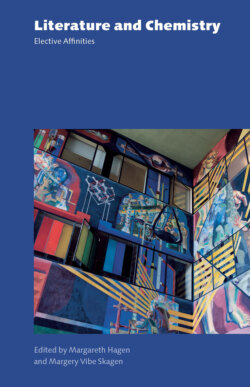Literature and Chemistry

Реклама. ООО «ЛитРес», ИНН: 7719571260.
Оглавление
Группа авторов. Literature and Chemistry
LITERATURE AND CHEMISTRY: ARTS AND CRAFTS OF TRANSFORMATION
LITERATURE AND SCIENCE: RECIPROCITY AND RESPECT FOR DIFFERENCES
LITERATURE AND CHEMISTRY: THE STATE OF THE FIELD
CHEMISTRY AND LIFE-WRITING
A SCIENCE WITH AN AMBIGUOUS REPUTATION
HISTORIES OF ALCHEMY
CHEMISTRIES OF PERSONAL INTERACTION
AFFINITIES OF POETRY AND CHEMISTRY
EARTH, AIR, FIRE, AND WATER VERSUS THE PERIODIC TABLE
LITERATURE, CHEMISTRY, AND THE SUBLIME
WORKS CITED
PRIMO LEVI’S CHEMICAL SENSORIUM
THE CHEMIST
THE CHEMIST-WRITER
THE EMPIRICIST
“THE MNEMAGOGUES”
THE SENSES
OTHER SENSES
WORKS CITED
AUTOBIOGRAPHY AND CHEMISTRY: PRIMO LEVI AND OLIVER SACKS
INTRODUCTION
THE CHEMISTRY OF WRITING
THE PERIODIC TABLE – AN ALLOY OF LITERARY GENRES
CHEMISTRY AS BILDUNG
THE HISTORY OF CHEMISTRY
THE DOUBLE NATURE OF CHEMISTRY
EKPHRASIS
CONCLUDING REMARKS
WORKS CITED
FROM “THE LIFE OF THE SPINOSIST” TO “LIFE”: HUMPHRY DAVY, CHEMIST AND POET
THE ANNUAL ANTHOLOGY AND BRISTOL, 1799-1801
FROM MANUSCRIPT TO PRINTED POEM
“LIFE” (1823)
CONCLUSION
WORKS CITED
AN UNLIKELY CANDIDATE FOR LITERATURE AND SCIENCE: THE NOSTALGIC LUDWIG BOLTZMANN IN ELDORADO
THE DESCENT OF A POLYMATH
ENTER THE ITALIAN PHILOSOPHER AS GUIDE
TEXTUAL NOSTALGICS
DEATH AFTER ELDORADO
THE UNLIKELY CANDIDATE GROPES FOR NARRATIVE
WORKS CITED
RAYMOND QUENEAU’S “THE SONG OF STYRENE”
INTRODUCTION
PERCEPTIONS: VISUAL, AURAL, AND COGNITIVE
THE FREEDOM OF TONE AND THE HUMOUR
TOWARDS A RENEWED ENCYCLOPAEDISM
THE CONTEXT
RAYMOND QUENEAU IN 1957
TEXTUAL ANALYSIS
THE METHOD OF COMPOSITION
CONCLUSION
WORKS CITED
THE INVISIBLE SCIENCE? CHEMISTRY, SCIENCE FICTION, AND POPULAR CULTURE
FUNCTIONS OF CHEMISTRY IN SCIENCE FICTION
CHEMISTRY AND DISCOVERY IN ALASTAIR REYNOLDS’S REVELATION SPACE
CHEMISTRY AND LIFE IN PAUL McAULEY’S THE QUIET WAR
CHEMISTRY AND THE PROJECT OF SCIENCE IN GREG EGAN’S THE CLOCKWORK ROCKET
WORKS CITED
IN THE ZONE: THE STRUGATSKII BROTHERS AND THE POETICS OF POLLUTION IN RUSSIAN SCIENCE FICTION
THE BROTHERS STRUGATSKII AND VERNADSKII’S BIOSPHERE
THE INHABITED ISLAND
ROADSIDE PICNIC
CONCLUSION
WORKS CITED
ALCHEMISTS AND ALCHEMY IN ITALIAN LITERATURE FROM ITS ORIGINS TO GALILEO GALILEI
THE MIDDLE AGES: FROM THE FIRST TUSCAN POETS TO DANTE AND CECCO D’ASCOLI
THE RENAISSANCE – FROM LEONARDO TO ARIOSTO
THE SEVENTEENTH CENTURY: GALILEO GALILEI – BETWEEN SCIENCE AND LITERATURE
WORKS CITED
ON THE ROLE OF ALCHEMY AND CHEMISTRY IN RUSSIAN LITERATURE AND CULTURE FROM PETER THE GREAT TO THE POST-SOVIET PERIOD
WORKS CITED
THE LITERARY DISTORTIONS OF ALCHEMY
NATHALIEL HAWTHORNE’S THE SCARLET LETTER
GUSTAV MEYRINK’S THE ANGEL OF THE WESTERN WINDOW
MARGUERITE YOURCENAR’S THE ABYSS
CONCLUSIONS
WORKS CITED
DEMONIC AFFINITIES: ON THE CHEMICAL ANALOGY IN GOETHE’S DIE WAHLVERWANDTSCHAFTEN
THE OXYMORONIC NATURE OF THE TERM “WAHLVERWANDTSCHAFT”
GOETHE’S USE OF THE TERM WAHLVERWANDTSCHAFT
NECESSITY AND FREEDOM
THE TWO COUPLES COMPARED
THE ELEMENT OF REPULSION
AN UNCANNY ANALOGY
THE MONSTROUS EVIL
THE NOVEL AS TRAGEDY
WORKS CITED
STRINDBERG, CHEMISTRY, AND THE DIVINE
STRINDBERG’S CHEMICAL TEXTS AND HOW TO READ THEM
CHEMISTS AND CHEMISTRY IN THE FICTION OF AUGUST STRINDBERG
WORKS CITED
THE MYSTICAL POWER OF CHEMISTRY – A BLIND SPOT IN DAG SOLSTAD’S FIRST NOVEL, IRR! GRØNT!
INTRODUCTION
THE PLOT
DESTROYING THE MYTH OF COLUMBUS
KARSTEN AND JOHN – CHEMICAL RESEARCHERS AND ROLE MODELS
CHEMISTRY AS RELIGION
HOMONCULUS
WORKS CITED
“THE PHOSPHORESCENCE OF PUTREFACTION AND THE SCENT OF THUNDERSTORMS”: APPROACHING A BAUDELAIREAN METAPHOR BY WAY OF LITERATURE AND CHEMISTRY
PHOSPHORESCENCE: NATURAL PHENOMENA WITH SUPERNATURAL CONNOTATIONS
THE ISOLATION OF PHOSPHORUS
AN EXPERIMENT ON PHOSPHORESCENCE IN THE AIR-PUMP
PHOSPHORUS THERAPIES FOR PHOSPHORESCENT BRAINS
PHOSPHORIC NERVE FLUID FLOWING INTO NINETEENTH-CENTURY FICTION
BAUDELAIRE’S (PSEUDO)SCIENTIFIC SUPERNATURALISM
“THE PHOSPHORESCENCE OF PUTREFACTION AND THE SCENT OF THUNDERSTORMS”
ENTRANCING OPPOSITES
RETURN TO ALCHEMY
CONJUNCTIONS OF EARTH AND FIRE: MÉLANCOLIQUE ET ARDENT
WORKS CITED
PASTERNAK’S WASSERMANN TEST
CONTEMPORARY INTERDISCIPLINARY ACTIVITY
“THE WASSERMANN TEST”
MY SISTER LIFE
METONYMICAL CHAINS AND SEITENKETTEN
PASTERNAK’S LITERARY WASSERMANN TEST
WORKS CITED
“DER STEIN DER WEISEN IST BLAU”: ALCHEMISTIC THOUGHT IN KONRAD BAYER’S LITERARY WORK
DER STEIN DER WEISEN: A KEY TO INSIGHT AND LINGUISTIC “READYMADE”
WITTGENSTEIN
HERMETICAL GEOGRAPHY
ABSOLUTE PRESENCE
WORKS CITED
CONTRIBUTORS
Отрывок из книги
Edited by
Margareth Hagen and Margery Vibe Skagen
.....
We do not have the very small of elementary particles or the soaring large of galaxies. Chemistry lacks that easy ladder to the sublime of boundlessness, of the downward or outward freeways to infinity. (Hoffmann, p. 150)
The layman or woman would not always agree. The idea that the same molecular structures that constitute the chemical building blocks of our living brains and bodies are to be found in the remotest nebulae of the cosmos is a source of fright and fascination. Just thinking about the conjunction of the universal and the particular, or the macro- and microscopic avenues underlying vast and small material phenomena, is enough to overwhelm most imaginations. The chemical and alchemical sublime is not absent from the literary examples presented in this volume. And for Hoffmann too, chemistry has its wonders. In his article he points to functional aspects of chemistry that touch upon the sublime, some of which are metaphorically transferable to our context of literary creation and scholarship. As seen in the chemical process of sublimation, in which a solid is transformed into gas and then back to a solid, change is “the defining essence of chemistry” (p. 152).19 The chemical object’s potential for change is an aspect of the dynamic sublime (p. 154).20 Furthermore, Hoffmann recognises a “median sublime” in “the living middle of human beings and molecules in equilibrium”, in the captured energy “suspended in a multidimensional space defined by crisscrossing polarities”, with its potential for reaction in one direction or the other. In our context of chemical and literary affinities, we note that the precarious state of balance between opposing forces, which some slight but decisive perturbation will release, is also an infinite source of narrative if we follow the basic schema of classical structuralism: when action is sparked off by some initial provocation and the characters are compelled to respond to the consequential trials and choices of the complication until the dilemmas are resolved through processes of separation and reconnection, allowing a new state of equilibrium to emerge, awaiting new narratives of transformation in turn.
.....